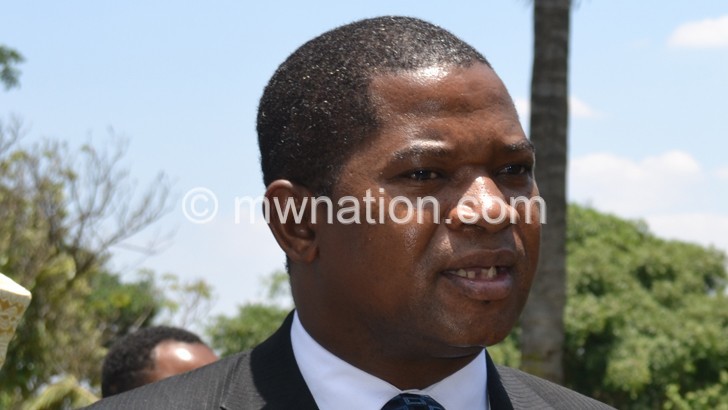Govt split on Aggreko, Egenco gensets proposal
Government is divided on the recommendation by the Parliamentary Committee on Natural Resources and Climate Change that Aggreko Power Solutions be relieved from the contract of supplying energy in favour of Egenco.
While the Malawi Energy Regulatory Authority (Mera) insists that the proposal is technically and practically not doable, the Cabinet Committee on Energy welcomed the idea, but states that Electricity Generating Company (Egenco) currently does not have the capacity to carry out the said task.

not practical
Parliamentary Committee chairperson, who is also Chitipa South legislator WeraniChilenga, on Tuesday said Aggreko is charging a lot for services that Egenco would provide at a lower cost if it were to use the same equipment.
Speaking after touring Wovwe Hydro power station in Karonga on Wednesday, Cabinet Committee chairperson BintonyKutsaira, who is also Minister of Natural Resources, Energy and Mining, said he supports Chilenga’s idea, but it cannot be implemented immediately.
He said Egenco is already managing generators at Luwinga in Mzuzu and Mapanga in Blantyre, and would require capacitating to take on board extra equipment.
Said Kutsaira: “For now, it is better for the country to continue paying heavily on electricity with Aggreko. It is a nice recommendation, but first we must ensure that Egenco has equipment. They have already started with a set of diesel engines in Mapanga and Mzuzu. So, they need to increase their capacity.
“I agree with the parliamentary committee, but for the meantime, I think everybody here agrees that it’s good for Malawi and the public to have expensive electricity which is available, than having none.”
On his part, Egenco chief executive officer William Liabunya said it would require a lot more to execute the plan, adding Malawi has to survive on the solution already in place.
He said: “What you are talking about is emergency power supply and indeed when you are in an emergency, you look for anything that will take you out of that emergency. That’s what was done to get power during those long outages that we were experiencing.
“We are a government entity, we follow normal procurement procedures according to the Procurement Act. We do not have finances that we can just fish out today, we need to go around and borrow to get some financing whether from government or wherever and that process cannot work in an emergency. I think we need to take note of that.”
But in his remarks, Mera chief executive officer Collins Magalasi said what the parliamentary committee had proposed was not doable, both technically and practically.
The only remedy, he said, was for Aggreko to sell electricity to Egenco, which would then resell it to Electricity Supply Corporation of Malawi (Escom).
Said Magalasi: “First of all, it is not possible, technically, practically for Aggreko gensets to be run by Egenco based on the law and what we approved. Both are IPPs, the only difference is that Egenco is an IPP owned by government while Aggreko is owned by the private sector.
“In the event that Aggreko gensets are run by Egenco, which I sad is not possible, the only feasible way would be for Aggreko to be selling power to Egenco and then Egenco to be selling power to Escom. How much will that cost Malawians? It will actually be more expensive and the law will not allow that.”
He said the discussion should be on Egenco increasing its own generators, further warning that pricing of electricity will not be cheaper just because the generators are run by Egenco.
“All the pricing of electricity in this country is done on cost basis, so we look at the cost of generating electricity to determine how much Malawians are going to pay. In this case, we looked at the cost of generating electricity using generators owned by Aggreko and that’s the price that we passed on to Escom.
“Likewise, if Egenco owns their own generators, we are looking at the cost of generation by Egenco, passing that on to the consumer. So it is a misconception to say that if the generators are run by Egenco, the electricity will be cheaper,” Magalasi explained.
The parliamentary committee made the resolution on Tuesday after meeting officials from the Ministry of Agriculture, Irrigation and Water Development, Egenco and Escom over persistent blackouts the country is facing.
Committee members unanimously recommended that the contract for generating electricity using gensets should be given to Egenco, which has proved that it can execute power generation responsibilities the same way Aggreko does.
Chilenga argued that Aggreko is charging exorbitant prices which have seen Escom draining its coffers over K675 million per month in power purchase deals. The amount also translates to a payout of over K7 billion to Aggreko annually.
“We are also concerned with the issue of Aggreko. >From our findings, Egenco is capable of doing the work that Aggreko is doing. But Aggreko is expensive as it is charging K202 per kilowatt when Egenco is charging K156. As a committee, we have recommended that this contract of supplying power using gensets should be given to Egenco.”
Escom chief executive officer Alexion Chiwaya argued that despite a rise in water levels, the company is still struggling to provide the required power to cater for the growing demand.
He said: “Customers need over 330 megawatts, but Escom is buying less than that. There is a gap of 47 megawatts, leading to load shedding. The demand is much higher than supply.
“We need to look at the energy mix and interconnect with other countries so that by 2022, load shedding should get to zero. Going forward to 2030, we will have a lot of surplus because the country will be connected to Zambia and Mozambique.”
Other notable faces during the visit were Deputy Minister of Energy MungasulwaMwambande, Minister of Transport and Public Infrastructure Ralph Jooma and Chiwaya.





